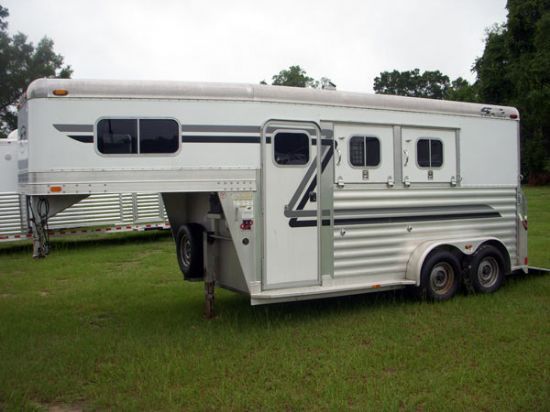You want to ensure there are no hang-ups or bad luck before you begin the journey. Overcome horse trailer hurdles before they happen by paying attention to the following trainer tips.
Know Thy Horse
Aside from medicinal needs, know the history of the horse. Ask about incidents with riding,transporting, and issues related to meeting new animals and people. A bad past experience could result in the owner making a wrong diagnosis in the future. For example, a fearful horse with a past may appear excessively stubborn rather than actually making a rational association.
Meet and Greet
Don’t let the hour of transport be the first time the horse is familiar with the trailer. Each horse is different, with respective pasts and personal quirks. Simulate the transport experience by introducing the horse to a particular trailer first. Do not buy that 2 horse gooseneck trailer for sale before associating the horse.
No Experience
If a horse has no prior experience with a trailer, you must not assume a long-distance transport will go as planned. Sometimes, a horse that refuses to get on a trailer is better than one that does and creates a stir. A forced horse could throw a tantrum and hurt themselves or trainers.
Take it Slow
Take things slow. If you have a great relation with the creature, it would be a shame to force it on the trailer and destroy established trust. Be patient and do not yell or hit the horse for not attending to your immediate wishes and time restraints.
Fear versus Defiance
As referenced, you have to determine whether your horse is being defiant or fearful of the trailer. You serve as the ‘alpha leader’ who ushers the horse onto the trailer. The horse trusts you to be a leader as well as to ultimately attend to its needs.
Familiar Grounds
Some trainers and transporters go as far as parking a trailer on arena grounds to lessen the stress of horses. Rather than ‘bring a horse to water,’ bring the trailer by the horse’s familiar grounds. Any actions and sentiments that take the horse’s attention away from resistance is a plus.
Zero Dominance
Yes, trainers and loaders play the dominant role, yet there should be no dominant force used to get the horse in the trailer. Of course, you could force the horse into the trailer, but you’re creating further tensions, future resistance, and lessening theanimal-human bond.
No Abandon
Stay close by the hip and head of your horse while walking them to the trailer. If a fearful horse feels its owner is abandoning it, the horse will grow more scared. Reassure an anxious horse that things are okay and there’s nothing to fear by keeping close to them.
Stocked Food
It’s not a definite solution in dealing with an overly disagreeable horse, yet keeping a supply of feed helps entice a horse or at least divert its attention. Moreover, you’ll be sorry if you’re on the road with a hungry horse and have no food.
Leading with a Cue
You canguide the horse onto the trailer by keeping its head and attention straight and urging them with a tapping of the hip and a cue (such as a kiss) in response to the action. Eventually, you can teach the horse to move forward without the reward of the kiss each time.
New Circumstances
Before ‘giving up’ on a stubborn or fearful horse, stay patient and consider changing the circumstances. Bring the trailer to a new destination to break any negative associations it may have to the previously failed location.
Get to Work
Try to persuade a resistant horse by putting it to work. Let the horse associate being outside of the trailer with working, and it will eventually get the point, opting to be inside the trailer rather than outside and tending to labor.
After the Fact
After loading, continue providing positive associations with the experience. This makes it likely there are lesser anxieties involved in future trailer experiences. Petting, loving speech, food and treats, and other positive sentiments make the animal more at peace and accepting of the trailer.
Estela Cooper has been running her own horse stables for two decades. With a love for horses formed in childhood, she works hard to nurture the animals and help train their owners with tips and insights for care.


